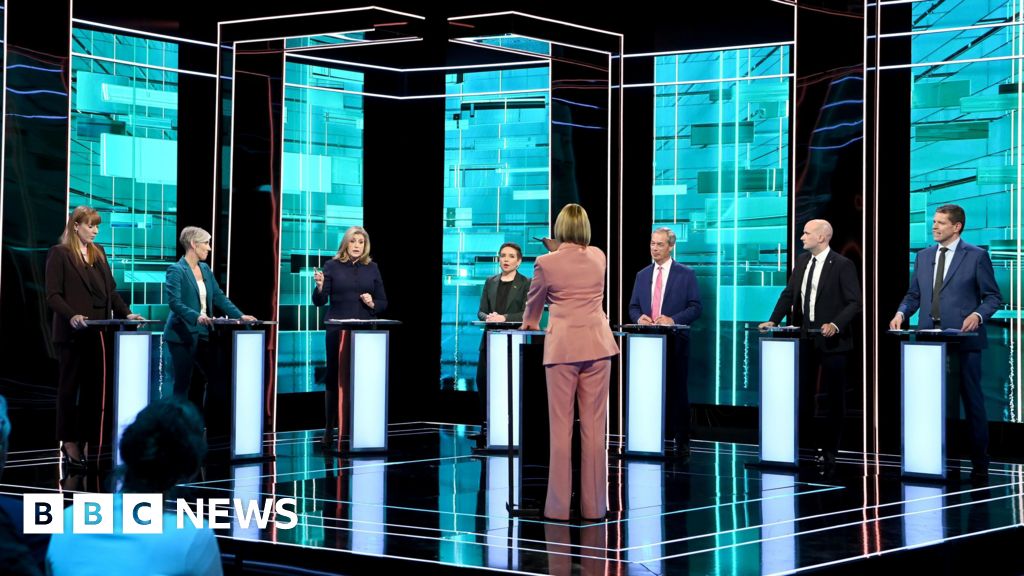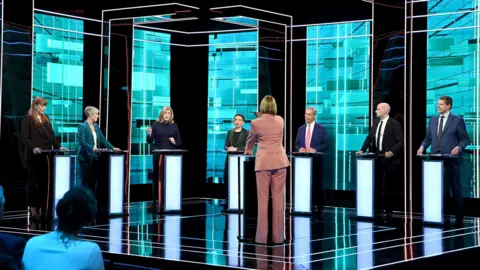World
General election 2024: Parties spar over tax and child benefit in seven-way debate

By Kate Whannel, Political reporter
 ITV/PA
ITV/PASeven candidates from the political parties traded blows over immigration, child benefit, tax and trust in a debate on ITV News.
Representatives from the Conservatives, Labour, the SNP, the Liberal Democrats, the Greens, Reform UK and Plaid Cymru faced questions from an audience in Salford, as well as each other, in a debate taking place at the midpoint of the six-week general election campaign.
Conservative Penny Mordaunt targeted her attack fairly relentlessly on Labour, repeatedly accusing them of planning to raise taxes – a claim Labour’s deputy leader Angela Rayner sought to rubbish.
The smaller parties, including the SNP, the Green Party and Plaid Cymru, also focused on Labour, often arguing it was too similar to the Conservatives.
Reform UK leader Nigel Farage argued he was now the “opposition to Labour”, pointing to a single poll that suggested his party could beat the Conservatives into third place, albeit within the margin of error.
A tracker of all the election polls can be found here.
During the campaign, Conservative figures have urged the party’s traditional voters not to back Reform UK, arguing it would put Keir Starmer in Downing Street.
On Thursday, Mr Farage sought to reflect that attack back on the Tories by saying a vote for them would “enable” a Labour government.
“A vote for you is actually now a vote for Labour,” he told Ms Mordaunt.
The Conservatives, he said, had repeatedly promised but failed to reduce immigration.
“Why on earth should anybody believe the fifth manifesto that promises cuts to net migration?” he asked.
Ms Mordaunt’s response – “because of the record of this prime minister” – prompted laughter from some members of the audience.
She pointed to a recent reduction in visa applications and forecasts that suggested immigration would be halved by next summer.
She accused Mr Farage of being “a Labour enabler” by splitting the Conservatives’ voter.
However, for most of the debate Ms Mordaunt focused her attention on Labour.
In her closing remarks she said Labour would push up taxes and bills.
“These are hard truths but better face them now than regret them later… don’t give a blank cheque to Labour.”
The debate took place on the same day as Labour launched its manifesto, which promised to boost growth in order to fund public services.
Ms Rayner stressed her party’s message, saying it would deliver growth “in every corner of the country”.
“Why so timid, why wait for growth?” the Greens’ co-leader, Carla Denyer, asked as she urged Ms Rayner to adopt her party’s plan to increase tax on the wealthier in society.
She said the Tories were “toast” and accused Labour of offering the “same broken politics dressed up with a red rosette”.
Labour’s deputy leader also faced criticism from the SNP’s Stephen Flynn.
He said it was “shameful” that Labour was not committing to re-joining the EU.
He also accused the party of accepting £18bn of cuts to the public sector.
Plaid Cymru leader Rhun ap Iorwerth expressed surprise that Labour was not promising to get rid of the two-child benefit limit, while Mr Farage appeared to back it.
“What’s happened to the Labour Party?” he asked as he argued that the cap damaged the poorest families.
Ms Rayner said her party would not commit to “unfunded” policies and pointed to Labour’s plan to provide breakfast clubs for children.
Questioned on the cap which restricts some benefits to the first two children in a family, Mr Farage said: “I think we should encourage people to have families.”

In an earlier discussion about immigration, Mr ap Iorwerth said politicians needed to listen to people’s “genuine concerns” as he accused Mr Farage of “exploiting the anxieties people have”.
Mr Flynn said Scotland’s businesses needed more migrants, not fewer, while Ms Rayner said the country’s economy had been too reliant on overseas workers and spoke about Labour’s plan to improve people’s skills.
Asked by ITV’s host Julie Etchingham if they thought immigration was too high, four out of seven raised their hands – Mr Farage, Ms Mordaunt, Liberal Democrat deputy leader Daisy Cooper and Ms Rayner.
For the final question, the politicians were asked how they would rebuild public trust in politics.
Ms Cooper said trust had been “blown to pieces” in recent years.
She said more power should be devolved to local communities and argued for proportional representation to replace the current voting model “so that every single vote of every single person actually counts in a general election”.
Her call to introduce proportional representation was also backed by Ms Denyer and Mr Farage.








:max_bytes(150000):strip_icc()/roundup-writereditor-loved-deals-tout-f5de51f85de145b2b1eb99cdb7b6cb84.jpg)


